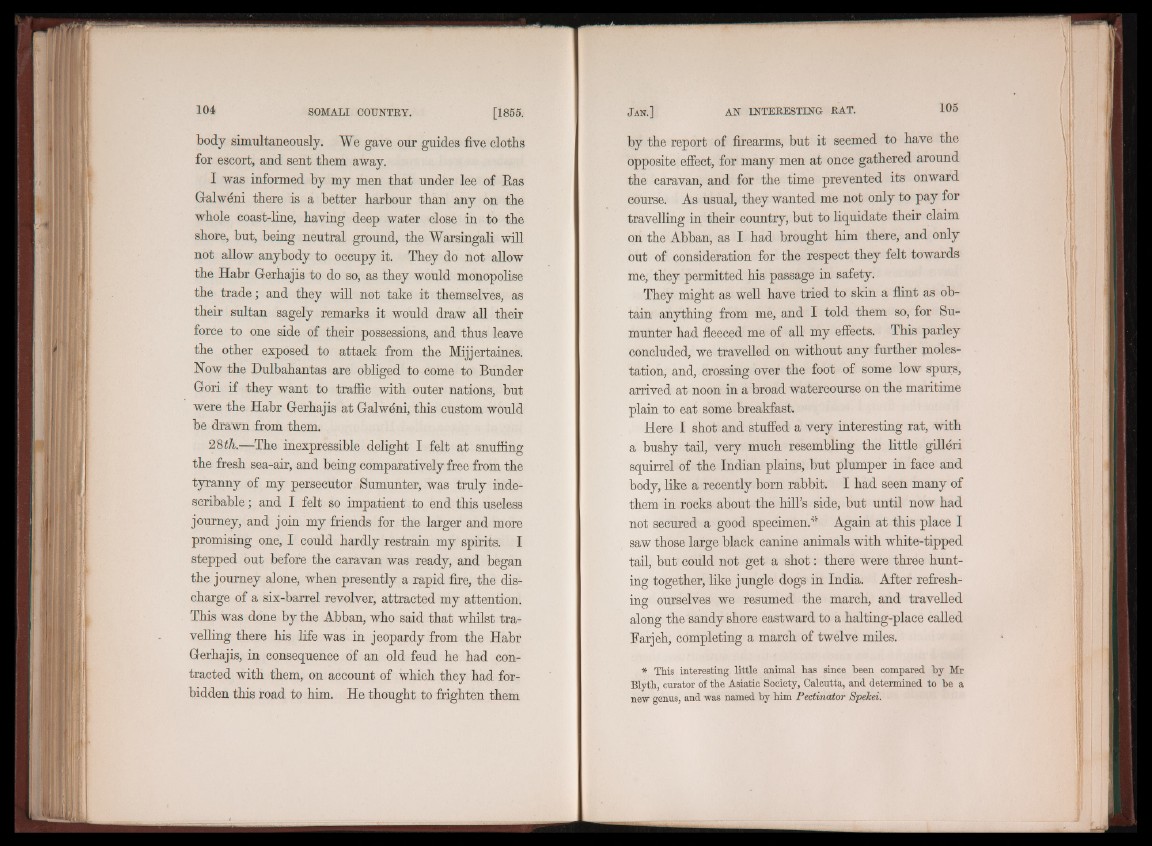
body simultaneously. We gave our guides five cloths
for escort, and sent them away.
I was informed by my men that under lee of Eas
Galwdni there is a better harbour than any on the
whole coast-line, haying deep water close in to the
shore, but, being neutral ground, the Warsingali will
not allow anybody to occupy it. They do not allow
the Habr G-erhajis to do so, as they would monopolise
the trade; and they will not take it themselves, as
their sultan sagely remarks it would draw all their
force to one side of their possessions, and thus leave
the other exposed to attack from the Mijjertaines.
Now the Dulbahantas are obliged to come to Bunder
G-ori if they want to traffic with outer nations, but
were the Habr Gerhajis at Galwdni, this custom would
be drawn from them.
28 th.—The inexpressible delight I felt at snuffing
the fresh sea-air, and being comparatively free from the
tyranny of my persecutor Sumunter, was truly indescribable
; and I felt so impatient to end this useless
journey, and join my friends for the larger and more
promising one, I could hardly restrain my spirits. I
stepped out before the caravan was ready, and began
the journey alone, when presently a rapid fire, the discharge
of a six-barrel revolver, attracted my attention.
This was done by the Abban, who said that whilst travelling
there his life was in jeopardy from the Habr
Gerhajis, in consequence of an old feud he had contracted
with them, on account of which they had forbidden
this road to him. He thought to frighten them
by the report of firearms, but it seemed to have the
opposite effect, for many men at once gathered around
the caravan, and for the time prevented its onward
course. As usual, they wanted me not only to pay for
travelling in their country, but to liquidate their claim
on the Abban, as I had brought him there, and only
out of consideration for the respect they felt towards
me, they permitted his passage in safety.
They might as well have tried to skin a flint as obtain
anything from me, and I told them so, for Sumunter
had fleeced me of all my effects. This parley
concluded, we travelled on without any further molestation,
and, crossing over the foot of some low spurs,
arrived at noon in a broad watercourse on the maritime
plain to eat some breakfast.
Here I shot and stuffed a very interesting rat, with
a bushy tail, very much resembling the little gilldri
squirrel of the Indian plains, but plumper in face and
body, like a recently bom rabbit. I had seen many of
them in rocks about the hill’s side, but until now had
not secured a good specimen.* Again at this place I
saw those large black canine animals with white-tipped
tail, but could not get a shot: there were three hunting
together, like jungle dogs in India. After refreshing
ourselves we resumed the march, and travelled
along the sandy shore eastward to a halting-place called
Farjeh, completing a march of twelve miles.
* This interesting little animal has since been compared hy Mr
Blyth, curator of the Asiatic Society, Calcutta, and determined to be a
new genus, and was named by him Pectinator SpeJcei.